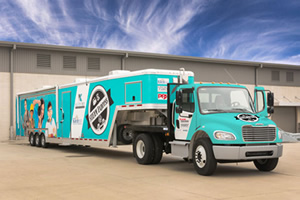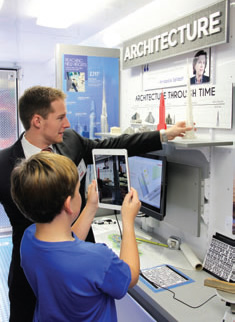The STEAM Express-Future Ready
 The city of Klein, Texas, is located just northwest of Houston. It is a warm, rural community that draws many families with its ideal balance of friendly charm and proximity to the Houston marketplace. The KEF (Klein ISD Education Foundation) is a non-profit organization “designed to provide direction and support for innovative academic and enrichment projects and staff development activities for the Klein ISD.”
The city of Klein, Texas, is located just northwest of Houston. It is a warm, rural community that draws many families with its ideal balance of friendly charm and proximity to the Houston marketplace. The KEF (Klein ISD Education Foundation) is a non-profit organization “designed to provide direction and support for innovative academic and enrichment projects and staff development activities for the Klein ISD.”
From the outset, the foundation had a dream to mobilize unique learning opportunities for a wide range of Science, Technology, Engineering, Arts and Mathematics (“STEAM”) subjects. The STEAM Express is a 48-foot Featherlite trailer custom built to showcase interactive exhibits and technology to students and the community within these content areas.
21st-century learning
Today’s students are continually saturated with media and are nearly unlimited with their access to information. Many educators struggle with how to adapt the way they learned or the methods with which they teach to a very different generation of students. To assist in this process, a number of curriculum “frameworks” have been developed to help shape and focus learning around core content and skills. One such framework is STEAM, which seeks to include the arts in the already popular approach called STEM. STEM which stands for Science, Technology, Engineering, and Mathematics, is often focused on developing career specific knowledge and skills while still implementing state-mandated learning requirements.
Mobile technology has exploded in the past five to eight years, and many schools are quickly accepting the technology’s rampant popularity and using its influence in a positive way. This explosion in mobile technology can often be expensive to implement district-wide. The STEAM Express is maximizing the district’s resources by using a mobile platform to bring technology and equipment to students that would otherwise be cost prohibitive to implement across campuses.
 Design process and content creation
Design process and content creation
A project development team of schoolteachers, administrators, technology staff, maintenance staff, as well as KEF directors, was assembled to give this project a pragmatic form. PBK facilitated group meetings and discussions to assist in defining the goals and arrived at five major objectives:
- Prepare elementary and junior high students for the STEAM curriculum being adopted in high schools.
- Educate the community on Klein ISD curriculum initiatives and STEAM principles.
- Outreach into the community and schools where opportunity and technology are not as prevalent.
- Accessibility — provide access to technology and activities too cost prohibitive to be implemented district-wide.
- Showcase career options, curriculum ingenuity, and applications of classroom technology.
The following design process involved case studies of mobile training centers, diagrammatic studies, and curriculum development specific to this mobile and flexible environment. PBK initially created three schematic layouts increasing in complexity. They ranged from a simple design with minimal structural and exterior changes to a “break-the-box” scheme with a fold down stage and digital displays that pivoted out for presentations. The project development team decided to move forward with the “break-the-box” scheme.
PBK Architects continued to work with the manufacturer’s engineers to ensure that the district’s safety and accessibility standards were not compromised throughout the design process. It took five months to complete construction and take delivery.
The incredible team of Klein ISD staff, and KEF, PBK and Featherlite employees brought together their individual expertise to bring to life the dream that was the STEAM Express. On Nov. 17, 2014, the Klein ISD Education Foundation officially donated the mobile classroom to the Klein ISD in a ceremony and media day to mark the official launch of the STEAM Express. Since the initial investment for the construction and design of the trailer was paid for by the Klein ISD Education Foundation through donations, the district is charged with physical maintenance and the continued updating of curricu
About the Author
Cindy Doyle currently directs the Community Relations & Education Foundation, Klein ISD, Joshua Burkhart, LEED Green Associate served as an architectural designer at PBK Architects, Ian Powell, AIA, LEED AP BD+C is a partner with PBK Architects.